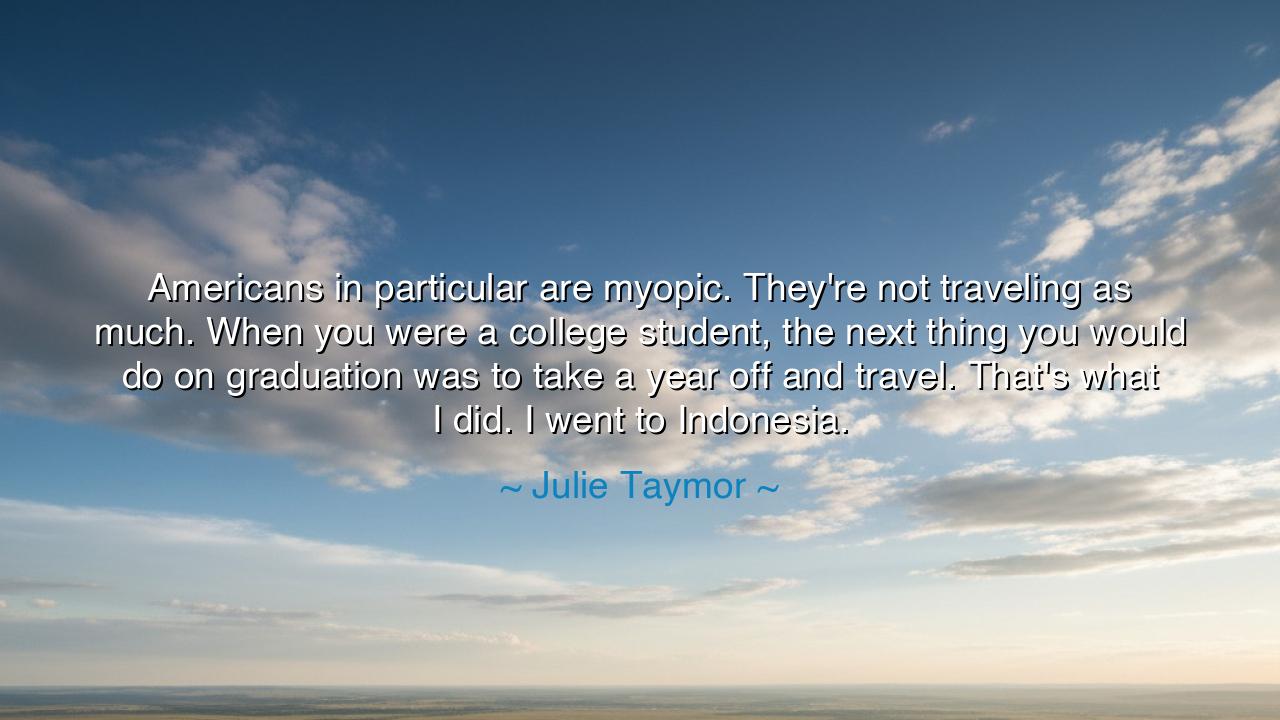
Americans in particular are myopic. They're not traveling as
Americans in particular are myopic. They're not traveling as much. When you were a college student, the next thing you would do on graduation was to take a year off and travel. That's what I did. I went to Indonesia.






Hear, O seeker of wisdom, the words of Julie Taymor, the visionary artist who brought myth and motion to the stage and screen: “Americans in particular are myopic. They’re not traveling as much. When you were a college student, the next thing you would do on graduation was to take a year off and travel. That’s what I did. I went to Indonesia.” These words, though wrapped in the language of reflection, strike with the force of a lament — a cry against the narrowing of the human spirit, a call to rediscover the vastness of the world and the humility that comes from wandering beyond one’s borders.
The meaning of this quote lies in the contrast between myopia and vision, between the confined and the expanded soul. Taymor speaks not only of geography, but of perception — for to travel is not merely to move the body across lands, but to open the mind to other ways of being. In her voice is both nostalgia and warning. She recalls a time when young people, upon graduation, did not rush into careers or possessions, but sought instead the deeper education that only the world can give — the schooling of the senses, the apprenticeship of experience. To her, this wandering was not indulgence, but initiation. The road, the sea, the foreign tongue — these were teachers more profound than any lecture hall.
The origin of her insight is woven into her own story. As a young graduate, Julie Taymor did not remain where comfort beckoned. She went forth into Indonesia, a land of ancient ritual and vivid artistry, where shadow puppets danced to the rhythm of gamelan, and storytelling was both sacred and communal. There, far from the familiar pulse of America, she learned not only new forms of theater, but new forms of seeing. It was in those years of immersion and solitude that the seeds of her later genius were sown — the cross-cultural vision that would breathe life into works like The Lion King, uniting myth, movement, and music into a tapestry of universal truth. Thus, when she warns against myopia, she speaks from the wisdom of one who has seen with her own eyes the power of stepping beyond the self.
In her words, there lies a quiet rebuke to the modern world — to the myopic nation that has grown inward, that builds walls of comfort and ignorance rather than bridges of understanding. To be myopic, in Taymor’s sense, is to forget that the world is vast and wondrous; it is to believe that one’s own culture, one’s own way of life, is the center of all things. This blindness breeds arrogance, fear, and stagnation. By contrast, to travel is to be humbled, to encounter beauty and strangeness that dissolve the illusion of superiority. It is to be reminded that truth has many languages, and wisdom many faces.
Consider, O reader, the tale of Ibn Battuta, the Moroccan scholar who, in the 14th century, set forth to see the world. Over thirty years he wandered, from Africa to India, from China to the islands of the Indian Ocean. When he returned home, he was no longer the same man. His heart had grown vast with understanding, his spirit tempered by the multiplicity of human life. His travels, like Taymor’s, became more than journeys — they were acts of transformation. Such wanderers remind us that travel is not an escape from life, but an entrance into its fullness.
What Julie Taymor laments, then, is not the loss of movement alone, but the loss of curiosity — that sacred hunger that once drove students, artists, and seekers to explore the unknown. She calls upon the young to reclaim that fire: to set forth after graduation, not only to see the world but to be shaped by it. For travel expands the imagination; it shatters the mirror of the self and replaces it with a window to the infinite. When one has walked foreign streets, heard songs in languages they do not understand, and broken bread with strangers, one returns home not with pride, but with humility — and that is the soil in which wisdom grows.
So let this be the lesson, O listener: break the walls of your myopia. Leave the familiar lands of comfort, and step into the unknown. If you are young, do not rush to anchor your life too soon — let the winds of the world carry you, and learn from every shore. If you are older, travel still — not merely across nations, but across minds, through books, through conversations, through empathy. For the heart that does not travel grows dull, but the one that ventures forth becomes a vessel of light. As Julie Taymor discovered in the temples and theaters of Indonesia, to travel is to rediscover one’s humanity. And when you return home, you will see that it is not the world that has changed — it is you who now sees the world with new and timeless eyes.






AAdministratorAdministrator
Welcome, honored guests. Please leave a comment, we will respond soon